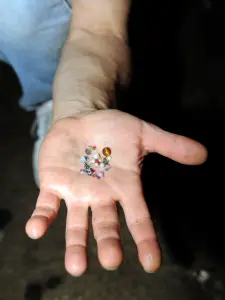April 25, 2024|י"ז ניסן ה' אלפים תשפ"ד Picking Up What We Dropped and Holding On Tight
Print Article
More than 2,600 independent businesses are located in the Diamond District, and nearly all of them are related to diamonds or fine jewelry. Raffi Stepanian originally worked for those businesses, making a living as a freelance diamond setter but after a few years, instead of being found inside the stores, he spent his time outside of them. Stepanian crawls on his hands and knees on the sidewalks armed with tweezers and a butter knife digging through cracks in the sidewalk, in search of tiny bits of valuables that most everyone would otherwise miss. Sometimes, he’ll find a pearl that fell off a broken necklace or a small diamond that came loose from a ring; other times, he’ll come across the gold backing from an earring, or some bits of gems shaved off in the shaping process by jewelry makers. For years, Raffi made a living by picking up what other people dropped, lost or forgot about.
The Torah describes Pesach as a night of protection - Layl shimurim hu la’Hashem. Rashi interprets “shimurim” in the sense of anticipation or preservation, commenting that since the creation of the world Hashem had been waiting to redeem His people. However, we apply this expression in the present, not just as part of the description of the past. Treating Seder night as a “Layl shimurim” has practical Halachic implications. Hashem’s presence is felt more intensely on Pesach night and protects us from danger. We therefore leave our doors unlocked, leave out part of krias shema al ha’mita, we don’t use salt with the matzah, and more.
But Layl Shimurim has implications beyond the first night of Pesach. In his Haggadah Beis Yaakov, the Izbitcher Rebbe has a magnificent explanation of this phrase. One of the challenges of life is the fleeting nature of our experiences, our relationships, our memories, and our feelings. Life is so fast-paced and chaotic that yesterday’s experiences are quickly forgotten, and today’s amazing conversations or moments will be gone by tomorrow. It is so hard to hold on to the feelings and experiences.
Pesach, says the Izbitcher, is the Layl Shimurim – it is a reservoir of lost things. Pesach is a time to recover lost feelings, thoughts, emotions, relationships, and experiences. On Pesach we reclaim what we thought was lost, we reconnect with what we thought was gone forever.
On Pesach we launch our count of the Omer which begins with the offering of the Korban Omer. On the second day of Pesach, thousands would come to watch the ketziras ha’omer, the reaping of the barley used for the Omer offering. The best fields, those south of Yerushalayim, were used as they produced the best grain. The reaping and harvesting was done with great pomp and ceremony. Why?
The Izbitcher explains, when the people saw the barley being harvested they were reminded of a powerful lesson. A person drops a seed, it gets buried under the ground, seemingly lost, squandered and forgotten. But if they come back to it, if they return to harvest it, they will see it wasn’t lost underground, wasn’t wasted at all. In that time it has taken root, blossomed and produced. The moments, experiences and conversations that seem dropped, lost, buried, disposed of, and despaired of, are revisited on Pesach, when we come to harvest, reap, and collect those seeds that have sprouted and grown all along.
I remember an interview with Rav Gamliel Rabinowitz, a great Rosh Yeshiva and Mekubal in Israel today. He was reflecting on his special father, Rav Levi Rabinowitz zt”l. Rav Levi was orphaned of both his father and mother by the time he was 9 years old and was raised in the Diskin Orphan Home. He could have despaired, given up, felt all alone in the world. Instead, he persevered with great faith, held on to the memories of those who came before, remained optimistic, positive and devoted to the study and spread of Torah. Ultimately, he emerged a respected talmid chacham and mechaber of the popular sefer Ma’adanei Shulchan, the Mishna Berura of Yoreh Dei’ah. He was so careful not to speak lashon ha’rah that Rav Elyashiv zt”l referred to him as “the Chofetz Chaim of the generation.”
Remarkably, by the time of his passing a few years ago, Rav Levi Rabinowitz, orphaned at a young age, had over 1,000 descendants. Reflecting on this amazing fact, his son Rav Gamliel said, “A person sees nothing, we have no idea what kind of seeds we carry within us, the unlimited potential of a human being.”
It is interesting to note that Pesach ends the way it began. On the eve of Pesach, we lit a candle to search for chametz, to identify what we must dispose of, throw out, and get rid of in our lives. On the last day of Pesach, we also have a candle lit, a yahrzeit candle to search again, but this time not for what we want to destroy, rather for what we want to recover, reclaim and take back.
On this Pesach, characterized by Layl Shimurim, we can collect all the diamonds and specks of gold that are part of our people that we may have dropped. Let’s gather the strength, faith, fortitude and resilience of those who came before us, including so many of our parents, grandparent and ancestors who overcame tremendous challenges in their times to bequeath to us the blessed life that we enjoy and let’s strengthen ourselves to navigate these times and to transmit these jewels to the next generation.






